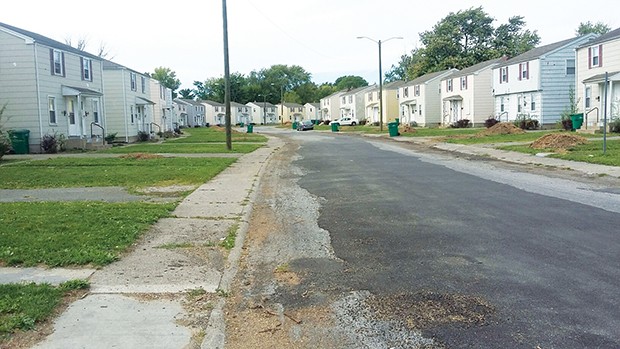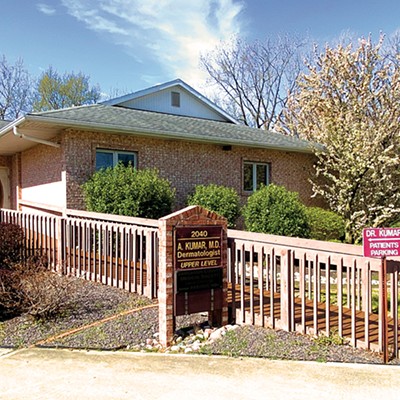
In one respect, at least, Poplar Place, a crumbling collection of duplex townhouses on the city’s east side, is beginning to resemble new west-side subdivisions where trees are just beginning to sprout from converted cornfields.
Dozens of mature shade trees lining streets in Poplar Place have been cut down. Where leaves and branches once offered respite from the sun, there are only stumps, trunks and mulch piles in front of homes, some occupied, some boarded up, some looking beyond repair.
“The only thing I don’t like is the heat,” says Cordale Johnson, who lives in the development and says that keeping cool in his home has become more challenging since the tree cutting began last month and was recently completed, with no trees left standing alongside Poplar Place streets.
Tree huggers are concerned. “It’s very distressing that all of the trees have come down,” says Rianne Hawkins, a member of the city’s recently appointed tree commission. “There should have been a process that the developer should have followed. …When trees come down, it increases the temperature of all those houses. It increases utility costs. It’s a much bigger issue than the trees don’t look good anymore.”
The cutting was done absent permits from the Springfield public works department, which must issue permits to cut down trees on public rights of way. In Poplar Place, streets and right-of-way are privately owned, and that’s long been a rub for the city, which has sued the development’s owner seeking improvements to streets pocked by potholes. Because streets and rights of way are privately owned, the city has no jurisdiction so far as trees are concdrned, says Nate Bottom, Springfield public works director.
If all goes well, Poplar Place will be redeveloped, with Iceberg Development Group, an Iowa-based firm, taking over from Related Management Company, a Chicago firm that did not return a phone call. Officials with Iceberg, also, could not be reached for comment, but Virginia Pace, a Chicago consultant who is helping put the deal together, said via email that the property has not yet changed hands.
Under the plan, Poplar Place would be revitalized at a cost of nearly $22 million, with more than a third of the 142 existing buildings demolished and the remainder refurbished into standalone houses and multi-unit townhouses. The city would spend $1.2 million in tax increment financing funds to fix streets.
Mayor Jim Langfelder said he recently spoke with Jim Bergman, an Iceberg principal, and was told that new trees will be planted. Trees that have been removed, the mayor said, were dying or diseased.
Jim Zerkle, corporation counsel, says he believes that trees were removed to allow for street and sidewalk repairs required by an agreement with the current owner reached late last year. The city, he said, has filed a motion in court asking a judge to order that terms of the agreement, including provisions for streets and sidewalks to be kept in good repair, be enforced.
“We expect them to comply with the agreement they made with regard to streets and sidewalks,” he said.
Ward 3 Ald. Doris Turner, who represents the area, said she has no concerns. The tree cutting, she said, is a sign of progress. “I think it’s great,” she said. The Poplar Place overhaul, she predicted, will be “transformational.” She said she has a timeline in mind for when redevelopment should be accomplished, but she would not say, when asked, whether her expected completion date is closer to six months or six years. Rather, she said, her expectation is somewhere in between.
Redevelopment is being financed largely by the Illinois Housing Development Authority, which last spring awarded $15 million tax credits for the project that also will require $3 million in private money. Johnson says residents were told in advance that trees were coming down, and redevelopment is needed.
“I’m definitely looking forward to that,” he said.
Contact Bruce Rushton at [email protected].





















